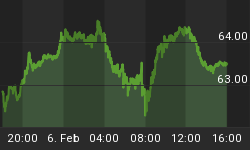When does a precious metal known for feeding off investors' fears need the opposite of fear to move higher? Answer: Right now!
Austin Kiddle, an analyst with bullion broker Sharps Pixley, asked the following question in a recent commentary: "Can fear refuel the investment demand for gold?" It's a question many investors are now asking and well worth addressing.
The real question behind this question that investors are asking is: "What will it take to propel gold higher in the near term?" While there's no denying gold is a fear hedge in prolonged periods of deep uncertainty, gold doesn't always benefit from fear in the short-term. The current economic environment is a good example of the exception to that rule. Gold has actually underperformed in the last five months relative to the U.S. dollar. The fear and uncertainty generated by the euro zone crisis resulted in a flight to safety to the dollar while gold was largely ignored by investors.
The following chart shows the extent of gold's underperformance by comparing the progression of the dollar ETF (symbol UUP) with the SPDR Gold Trust ETF (symbol GLD). This graph clearly shows that investors have favored cash over the yellow metal during the most intensive part of the euro zone fear in the March-June period.

Since June, which was a pivotal month in reversing the public's extreme fear of a euro zone collapse, gold has been playing a game of catch-up with the dollar and is nearly even with the greenback on a relative strength basis (see chart below).

The lesson here is that gold's underperformance in the March-June period was due to investors' fears, but its subsequent bounce back since June can be attributed to gradually diminished fears. If this relationship holds, gold's short-term outlook will be bolstered by a decrease in risk aversion among investors, not fear. With the 4-year cycle peaking into October, gold can ride the cresting optimism over the broad market uptrend for equities and commodities as well as the latest "quick fix" in the ongoing euro zone crisis.
So it is that gold finds itself - temporarily at least - in the perverse position of requiring a diminution of fear and pessimism among market participants to bolster its price. Gold, in other words, will benefit more from good news than bad news in the near term. Investors shouldn't expect this imbalance of investor psychology to last very long, however. Gold will likely return to its historical tendency of feeding off fear once the election is over and the 4-year cycle has peaked. Until then, we can only follow the lead of the short-term technical indicators while gold benefits from the market's falling risk aversion.















